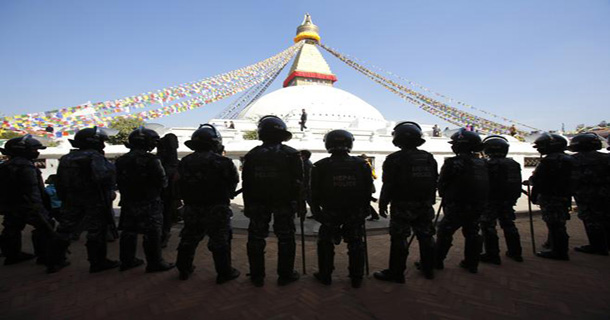
Nepal police surrounds Boudhanath stupa after a Tibetan monk self-immolated in Kathmandu in 2013
Photo: Reuters
America has expressed concern over the situation of Tibetan refugees in Nepal. They were speaking at the 23rd session of the Universal Periodic Review at the United Nations Human Rights Council in Geneva in Switzerland on November, 4.
While expressing their serious concern at the Review, they acknowledged there has been a slight improvement in implementing Nepal’s new policy which limits the recruitment fee from migrant workers to prevent them being exploited abroad. Amanda Jessen, on behalf of the United States, recommended that Nepal register political refugees and provide documentation so that they can have access to education, job opportunities and travel.
Jessen continued, “We are also concerned that over 20 years have passed since the last registration of Tibetan refugees, leaving the majority of the population undocumented without the right to work and ability to travel.”
The Review report raised concerns about the rehabilitation and restoration of earthquake victims and the discriminatory allocation of relief funds and resources in the affected areas, particularly among Dalits and other marginalised groups. It also emphasised the amendments needed in the Nepal constitution to give religious freedom and allow women to convey their citizenship to their children and foreign spouses on an equal basis with men.
The Human Rights Council is an intergovernmental body within the United Nations system. It consists of 47 United Nations member states which are elected by the UN General Assembly. It is responsible for strengthening the promotion and protection of human rights around the globe and for addressing situations of human rights violations and making recommendations on them. It has the ability to discuss all thematic human rights issues and situations that require its attention throughout the year. It meets at the UN Office at Geneva.




 Print
Print Email
Email